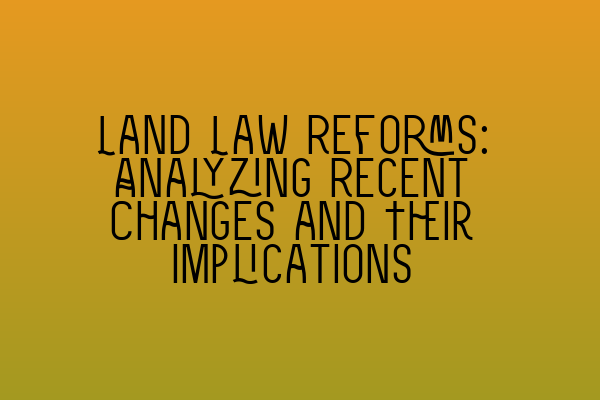Land Law Reforms: Analyzing Recent Changes and Their Implications
The field of property law is constantly evolving, and recent changes in land law have significant implications for individuals and businesses involved in real estate transactions. As solicitors at SQE Property Law, it is our duty to stay up-to-date with these reforms and provide our clients with the most accurate legal advice. In this article, we will analyze some of the recent changes in land law and discuss their implications in detail.
1. Introduction to Land Law Reforms
Land law reforms play a crucial role in ensuring a fair and efficient property market. The recent changes have focused on various aspects of land law, including property ownership, land registration, and the rights and responsibilities of landlords and tenants. By understanding these reforms, individuals and businesses can navigate the complexities of property transactions more effectively.
1.1 Property Ownership
One significant reform in property ownership is the introduction of the Land Ownership Act 2021, which aims to streamline the process of transferring ownership of land. Under this act, individuals can now apply for electronic title deeds, reducing the time and effort involved in traditional paper-based transactions. This reform not only increases efficiency but also enhances transparency in property transfers.
For more detailed information on property ownership and the Land Ownership Act 2021, you can refer to SQE Property Law’s blog post: SQE 1 Practice Exam Questions.
1.2 Land Registration
Another significant reform in land law pertains to land registration. The Land Registration Act 2020 introduces a more unified and modern system of land registration, which aims to reduce inconsistencies and errors in the registration process. This reform provides greater certainty for property buyers and enhances the integrity of the land registration system as a whole.
For a comprehensive understanding of land registration reforms and their implications, check out our article on SQE Property Law’s blog: SQE 1 Practice Mocks FLK1 FLK2.
2. Implications of Land Law Reforms
These recent reforms have several implications for individuals and businesses involved in property transactions. It is essential to understand these implications to ensure compliance with the new laws and to protect your rights as a property owner, landlord, or tenant.
2.1 Greater Efficiency
The introduction of electronic title deeds and the modernized land registration system significantly streamlines property transactions. This increased efficiency simplifies the process and reduces administrative burdens for individuals and businesses. Time-consuming tasks, such as document preparation and physical verification, can now be completed more swiftly and accurately.
2.2 Enhanced Transparency
Transparency in property transactions is crucial for maintaining trust and confidence in the market. The recent reforms in land ownership and land registration promote transparency by digitizing records and providing accessible information to interested parties. This transparency enables buyers, sellers, landlords, and tenants to make informed decisions and ensures fair dealings in the property market.
2.3 Improved Legal Certainty
The reforms in land law contribute to increased legal certainty for all parties involved in property transactions. Clearer and more consistent rules and procedures minimize potential disputes and protect the rights of property owners and tenants. This improved legal certainty instills confidence in investors and promotes a stable property market.
If you want in-depth insights into the implications of land law reforms, SQE Property Law’s blog post on SQE 2 Preparation Courses provides comprehensive information.
3. Conclusion
The recent land law reforms have brought about significant changes in property ownership, land registration, and the rights and responsibilities of landlords and tenants. Understanding these reforms and their implications is crucial for individuals and businesses involved in property transactions.
At SQE Property Law, we stay updated with the latest changes in land law and provide expert advice to our clients. For more information on property law and preparation for the SQE exams, refer to our blog posts on SQE 1 Preparation Courses and SRA SQE Exam Dates.
We are committed to helping you navigate the complexities of property law and ensuring your legal rights are protected. Contact SQE Property Law today for personalized legal advice and assistance with all your property law needs.
